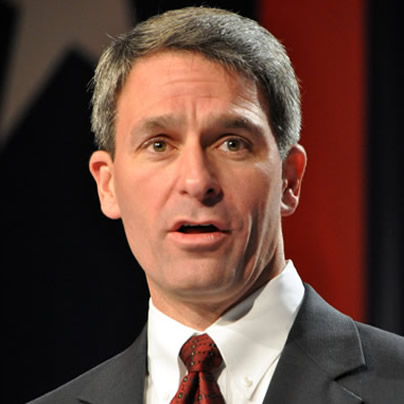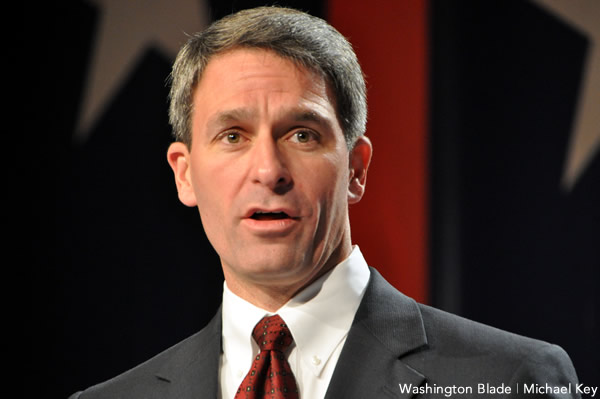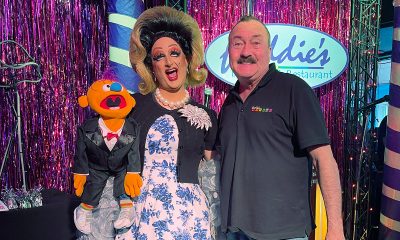Local
Cuccinelli challenges Va. sodomy ruling
Att’y gen’l asks appeals court for re-hearing of case


Virginia Attorney General Kenneth Cuccinelli is challenging a ruling that overturned the state’s sodomy law. (Washington Blade file photo by Michael Key)
Virginia Attorney General Kenneth Cuccinelli has filed a petition with the 4th Circuit U.S. Court of Appeals in Richmond asking the full 15-judge court to reconsider a decision by a three-judge panel last month that overturned the state’s sodomy law.
The three-judge panel ruled 2-1 on March 12 that a section of Virginia’s “Crimes Against Nature” statute that outlaws sodomy between consenting adults, gay or straight, is unconstitutional based on a U.S. Supreme Court decision in 2003 known as Lawrence v. Texas.
A clerk with the 4th Circuit appeals court said a representative of the Virginia Attorney General’s office filed the petition on Cuccinelli’s behalf on March 26. The petition requests what is known as an en banc hearing before the full 15 judges to reconsider the earlier ruling by the three-judge panel.
“We certainly hope they won’t,” said Claire Gastanaga, executive director of the ACLU of Virginia, which filed a friend of the court brief urging the three-judge panel to overturn the state sodomy law.
“We think it’s a situation in which everybody agrees that the statute is unconstitutional,” Gastanaga told the Blade.
Greg Nevins, an attorney with the LGBT litigation group Lambda Legal Defense and Education Fund, which joined the ACLU in filing the friend of the court brief calling for overturning the Virginia sodomy law, said requests for en banc hearings are turned down most of the time.
He quoted a federal appeals court rule as stating, “Although petitions for rehearing are filed in a great many cases, few are granted.”
Caroline Gibson, a spokesperson for Cuccinelli, told the Blade in an email that Cuccinelli believes the dissenting judge on the three-judge panel was correct in stating the Lawrence decision applies only to sex between consenting adults in private and doesn’t apply to cases involving a minor. The case in which the three-judge panel of the 4th Circuit Court of Appeals overturned the Virginia sodomy law involved a man charged with soliciting oral sex from a 17-year-old woman.
“We believe the panel decision was erroneous, and that the dissent correctly concludes that the petitioner was not entitled to federal habeas corpus relief, Gibson said, referring to the court’s decision to overturn the man’s conviction under the sodomy law. “So the full court should have the opportunity to decide this matter,” she said.
“Like most people, we think the court made the right decision,” said James Parrish, executive director of the LGBT advocacy group Equality Virginia.
“We think what needs to happen is the General Assembly needs to remove the current sodomy law that has been declared unconstitutional,” he said.
Parrish said Equality Virginia wouldn’t object to a careful revision by the legislature of the state’s criminal code to allow for continued prosecution of offenses such as sex with minors.
“What we’re saying is we agree with the court ruling that, in this case, the law was used unconstitutionally. The best course of action would be for the General Assembly to address that, just like they did with the cohabitation law that they took off the books this year,” he said.
“We think that’s a better recourse than the Attorney General filing another appeal and diverting precious state resources on an issue that the General Assembly should address because the court made the correct ruling on March 12,” Parris said.
Virginia State Sen. Adam Ebbin (D-Alexandria), who’s gay, said he is looking into the issue and the possibility of introducing legislation to address it.
“I’m reviewing this and will consider introducing a bill next year to repeal the Virginia Crimes Against Nature law for consenting adults,” he told the Blade.
The March 12 ruling of the appeals court’s three-judge panel overturned a lower court decision upholding the conviction of a 37-year-old man charged in 2005 with soliciting a 17-year-old woman to engage in oral sex. No sexual encounter took place, records show.
The Attorney General’s office argued that the Supreme Court’s Lawrence decision didn’t apply to cases involving minors. But 4th Circuit Appeals Court Judge Robert King, who wrote the majority opinion, said the Lawrence decision rendered the Virginia sodomy statue “facially” or completely unconstitutional.
He stated other laws could be used to prosecute an adult for engaging in sex with a minor and that the Virginia General Assembly would likely have authority under the Lawrence decision to pass a new law specifically outlawing sodomy between an adult and a minor.
Maryland
Rockville teen charged with plotting school shooting after FBI finds ‘manifesto’
Alex Ye charged with threats of mass violence

BY BRETT BARROUQUERE | A Montgomery County high school student is charged with what police describe as plans to commit a school shooting.
Andrea Ye, 18, of Rockville, whose preferred name is Alex Ye, is charged with threats of mass violence. Montgomery County Police and the FBI arrested Ye Wednesday.
The rest of this article can be found on the Baltimore Banner’s website.
District of Columbia
New D.C. LGBTQ+ bar Crush set to open April 19
An ‘all-inclusive entertainment haven,’ with dance floor, roof deck

D.C.’s newest LGBTQ+ bar called Crush is scheduled to open for business at 4 p.m. on Friday, April 19, in a spacious, two-story building with a dance floor and roof deck at 2007 14th St., N.W. in one of the city’s bustling nightlife areas.
A statement released by co-owners Stephen Rutgers and Mark Rutstein earlier this year says the new bar will provide an atmosphere that blends “nostalgia with contemporary nightlife” in a building that was home to a popular music store and radio supply shop.
Rutgers said the opening comes one day after Crush received final approval of its liquor license that was transferred from the Owl Room, a bar that operated in the same building before closing Dec. 31 of last year. The official opening also comes three days after Crush hosted a pre-opening reception for family, friends, and community members on Tuesday, April 16.
Among those attending, Rutgers said, were officials with several prominent local LGBTQ organizations, including officials with the DC Center for the LGBTQ Community, which is located across the street from Crush in the city’s Reeves Center municipal building. Also attending were Japer Bowles, director of the Mayor’s Office of LGBTQ Affairs, and Salah Czapary, director of the Mayor’s Office of Nightlife and Culture.
Rutgers said Crush plans to hold a grand opening event in a few weeks after he, Rutstein and the bar’s employees become settled into their newly opened operations.
“Step into a venue where inclusivity isn’t just a promise but a vibrant reality,” a statement posted on the Crush website says. “Imagine an all-inclusive entertainment haven where diversity isn’t just celebrated, it’s embraced as the very heartbeat of our venue,” the statement says. “Welcome to a place where love knows no bounds, and the only color or preference that matters is the vibrant tapestry of humanity itself. Welcome to Crush.”
The website says Crush will be open Tuesdays and Wednesdays from 4 p.m. to 12 a.m., Thursdays from 4 p.m. to 2 a.m., Fridays from 4 p.m. to 3 a.m., Saturdays from 2 p.m. to 3 a.m., and Sundays from 2 p.m. to 12 a.m. It will be closed on Mondays.
Crush is located less than two blocks from the U Street Metro station.
District of Columbia
Reenactment of first gay rights picket at White House draws interest of tourists
LGBTQ activists carry signs from historic 1965 protest

About 30 LGBTQ activists formed a circular picket line in front of the White House Wednesday afternoon, April 17, carrying signs calling for an end to discrimination against “homosexuals” in a reenactment of the first gay rights protest at the White House that took place 59 years earlier on April 17, 1965.
Crowds of tourists looked on with interest as the activists walked back and forth in silence in front of the White House fence on Pennsylvania Avenue. Like the 1965 event, several of the men were dressed in suits and ties and the women in dresses in keeping with a 1960s era dress code policy for protests of the Mattachine Society of Washington, D.C., the city’s first gay rights group that organized the 1965 event.
Wednesday’s reenactment was organized by D.C.’s Rainbow History Project, which made it clear that the event was not intended as a protest against President Joe Biden and his administration, which the group praised as a strong supporter of LGBTQ rights.
“I think this was an amazing event,” said Vincent Slatt, the Rainbow History Project official who led efforts to put on the event. “We had twice as many that we had hoped for that came today,” he said.
“It was so great to see a reenactment and so great to see how far we’ve come,” Slatt said. “And also, the acknowledgement of what else we still need to do.”
Slatt said participants in the event who were not carrying picket signs handed out literature explaining the purpose of the event.
A flier handed out by participants noted that among the demands of the protesters at the 1965 event were to end the ban on homosexuals from working in the federal government, an end to the ban on gays serving in the military, an end to the denial of security clearances for gays, and an end of the government’s refusal to meet with the LGBTQ community.
“The other thing that I think is really, really moving is some of the gay staff inside the White House found out this was happening and came out to greet us,” Slatt said. He noted that this highlighted how much has changed since 1965, when then President Lyndon Johnson’s White House refused to respond to a letter sent to Johnson from the Mattachine Society explaining its grievances.
“So now to have gay people in the White House coming out to give us their respects and to say hello was especially meaningful to us,” Slatt said. “That was not expected today.”
Among those walking the picket line was longtime D.C. LGBTQ rights advocate Paul Kuntzler, who is the only known surviving person who was among the White House picketers at the April 1965 event. Kuntzler said he proudly carried a newly printed version of the sign at Wednesday’s reenactment event that he carried during the 1965 protest. It stated, “Fifteen Million Homosexuals Protest Federal Treatment.”
Also participating in the event was Japer Bowles, director of D.C. Mayor Muriel Bowser’s Office of LGBTQ Affairs. Bowles presented Slatt with a proclamation issued by Bowser declaring April 17, 2024, Mattachine Society Day in Washington, D.C.
“Whereas, on April 17, 1965, the Mattachine Society of Washington courageously held the nation’s inaugural picket for gay rights, a seminal moment in the ongoing struggle for LGBTQIA+ equality in the United States, marking the genesis of public demonstrations advocating for those rights and paving the way for Pride Marches and Pride celebrations worldwide,” the proclamation states.
About 30 minutes after the reenactment event began, uniformed Secret Service agents informed Slatt that due to a security issue the picketers would have to move off the sidewalk in front of the White House and resume the picketing across the street on the sidewalk in front of Lafayette Park. When asked by the Washington Blade what the security issue was about, one of the Secret Service officers said he did not have any further details other than that his superiors informed him that the White House sidewalk would have to be temporarily cleared of all people.
Participants in the event quickly resumed their picket line on the sidewalk in front of Lafayette Park for another 30 minutes or so in keeping with the 1965 picketing event, which lasted for one hour, from 4:20 p.m. to 5:20 p.m., according to Rainbow History Project’s research into the 1965 event.
Although the LGBTQ picketers continued their procession in silence, a separate protest in Lafayette Park a short distance from the LGBTQ picketers included speakers shouting through amplified speakers. The protest was against the government of Saudi Arabia and organized by a Muslim group called Al Baqee Organization.
A statement released by the Rainbow History Project says the reenactment event, among other things, was a tribute to D.C.-area lesbian rights advocate Lilli Vincenz, who participated in the 1965 White House picketing, and D.C. gay rights pioneer Frank Kameny, who founded the Mattachine Society of Washington in the early 1960s and was the lead organizer of the 1965 White House protest. Kameny died in 2011 and Vincenz died in 2023.
The picket signs carried by participants in the reenactment event, which were reproduced from the 1965 event, had these messages:
• “DISCRIMINATION Against Homosexuals is as immoral as Discrimination Against Negroes and Jews;”
• “Government Should Combat Prejudice NOT PROMOTE IT”
• “White House Refuses Replies to Our Letters, AFRAID OF US?
• “HOMOSEXUALS Died for their Country, Too”
• “First Class Citizenship for HOMOSEXUALS”
• “Sexual Preference is Irrelevant to Employment”
• “Fifteen Million U.S. Homosexuals Protest Federal Treatment”
-

 Africa4 days ago
Africa4 days agoCongolese lawmaker introduces anti-homosexuality bill
-

 District of Columbia24 hours ago
District of Columbia24 hours agoReenactment of first gay rights picket at White House draws interest of tourists
-

 World4 days ago
World4 days agoOut in the World: LGBTQ news from Europe and Asia
-

 Arizona1 day ago
Arizona1 day agoAriz. governor vetoes anti-transgender, Ten Commandments bill










